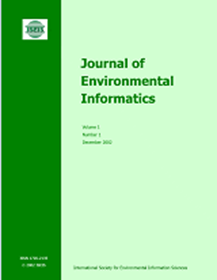Modeling of Orange Carbon Dots-CO2 Interaction and Its Effects on Photosynthesis and Productivity in Maize and Green Beans
IF 5.4
1区 环境科学与生态学
Q1 ENVIRONMENTAL SCIENCES
引用次数: 0
Abstract
Crop yield increases with a sustained increase in leaf photosynthesis. Due to many limitations, plants do not sufficiently use their photosynthetic capacity. Carbon dots (CDs) have a high light harvest capability, which may be used to improve the photosynthesis efficiency of plants. In this study, nontoxic orange CDs (o-CDs) were foliarly applied to boost the maize (Zea mays L.) and green beans (Phaseolus vulgaris L.) productivity in the field. Leaves of both plant species were sprayed three times with 1 and 5 mg/L of the o-CDs aqueous solutions in equal intervals during the vegetative growth stage until flowering. To find the best geometries for CO2 adsorption on o-CD, modeling of o-CDs-CO2 interaction was performed. Photosynthesis parameters and fruit yield were measured during plant growth. Total phenolic content and antioxidative activity were monitored as oxidative stress indicators. Computational simulations and spectroscopic measurements suggest that o-CDs, acting as a “CO2 delivery” system, can enhance photosynthetic efficiency. Photosynthesis was enhanced in both plant species, but only green beans showed an increased fruit yield. CO2 use in tested species was discussed in light of two mechanisms. Plant species show different, but no significant antioxidative responses. The chemical surface composition has shown that o-CDs were not contained in either the leaves or fruits of the treated plants. The results indicate that o-CDs may be applied as a simple and safe biostimulator on plants. That could have an environmental benefit in capturing CO2 in the atmosphere橙色碳点与二氧化碳的相互作用及其对玉米和青豆光合作用和生产率的影响建模
作物产量会随着叶片光合作用的持续增加而增加。由于诸多限制,植物无法充分发挥其光合作用能力。碳点(CD)具有很强的采光能力,可用于提高植物的光合作用效率。本研究通过叶面喷施无毒的橙色碳点(o-CDs)来提高玉米(Zea mays L.)和青豆(Phaseolus vulgaris L.)的产量。两种植物的叶片在无性生长期至开花期期间以相同的间隔喷洒三次 1 毫克/升和 5 毫克/升的 o-CDs 水溶液。为了找到 o-CD 吸附 CO2 的最佳几何形状,对 o-CD 与 CO2 的相互作用进行了建模。在植物生长过程中测量了光合作用参数和果实产量。作为氧化应激指标,对总酚含量和抗氧化活性进行了监测。计算模拟和光谱测量结果表明,o-CDs 作为一种 "二氧化碳输送 "系统,可以提高光合作用效率。两种植物的光合作用都得到了增强,但只有青豆的果实产量有所增加。根据两种机制讨论了测试物种对二氧化碳的利用。植物物种表现出不同的抗氧化反应,但并不显著。化学表面成分显示,处理过的植物叶片和果实中都不含邻氯二苯醚。研究结果表明,邻氯化二苯并二噁英可作为一种简单、安全的生物刺激剂用于植物。这对捕捉大气中的二氧化碳具有环境效益
本文章由计算机程序翻译,如有差异,请以英文原文为准。
求助全文
约1分钟内获得全文
求助全文
来源期刊

Journal of Environmental Informatics
ENVIRONMENTAL SCIENCES-
CiteScore
12.40
自引率
2.90%
发文量
7
审稿时长
24 months
期刊介绍:
Journal of Environmental Informatics (JEI) is an international, peer-reviewed, and interdisciplinary publication designed to foster research innovation and discovery on basic science and information technology for addressing various environmental problems. The journal aims to motivate and enhance the integration of science and technology to help develop sustainable solutions that are consensus-oriented, risk-informed, scientifically-based and cost-effective. JEI serves researchers, educators and practitioners who are interested in theoretical and/or applied aspects of environmental science, regardless of disciplinary boundaries. The topics addressed by the journal include:
- Planning of energy, environmental and ecological management systems
- Simulation, optimization and Environmental decision support
- Environmental geomatics - GIS, RS and other spatial information technologies
- Informatics for environmental chemistry and biochemistry
- Environmental applications of functional materials
- Environmental phenomena at atomic, molecular and macromolecular scales
- Modeling of chemical, biological and environmental processes
- Modeling of biotechnological systems for enhanced pollution mitigation
- Computer graphics and visualization for environmental decision support
- Artificial intelligence and expert systems for environmental applications
- Environmental statistics and risk analysis
- Climate modeling, downscaling, impact assessment, and adaptation planning
- Other areas of environmental systems science and information technology.
 求助内容:
求助内容: 应助结果提醒方式:
应助结果提醒方式:


